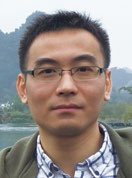Oral Presentation 5
Wnt regulation of planar cell polarity in development and disease
Gao Bo
The University of Hong Kong
 Dr Gao obtained his bachelor and doctoral degrees from the Shanghai Jiao Tong University in Shanghai, China, with three years of his PhD training at The University of Hong Kong partially supported by Dr Cheng Yu Tung Fellowships. He received his research training in the fields of human and mouse genetics. After completing a postdoctoral fellowship at U.S National Human Genome Research Institute, he worked as staff scientist at the National Institutes of Health (NIH). In 2015, Dr Gao joined The University of Hong Kong as tenure-track Assistant Professor. He is interested in studying cell signaling in development and disease, with focus on elucidating the molecular mechanisms of Wnt/Planar Cell Polarity signaling and a variety of human skeletal and connective tissues disorders.
Dr Gao obtained his bachelor and doctoral degrees from the Shanghai Jiao Tong University in Shanghai, China, with three years of his PhD training at The University of Hong Kong partially supported by Dr Cheng Yu Tung Fellowships. He received his research training in the fields of human and mouse genetics. After completing a postdoctoral fellowship at U.S National Human Genome Research Institute, he worked as staff scientist at the National Institutes of Health (NIH). In 2015, Dr Gao joined The University of Hong Kong as tenure-track Assistant Professor. He is interested in studying cell signaling in development and disease, with focus on elucidating the molecular mechanisms of Wnt/Planar Cell Polarity signaling and a variety of human skeletal and connective tissues disorders.
高波,2000年畢業於上海交通大學,獲學士學位,並於同年攻讀本校博士研究生,期間獲鄭裕彤博士?助金赴香港大學從事科研工作,2005年獲博士學位並作為博士後繼續在香港大學工作。2007年作為訪問學者赴美國國立健康研究院(NIH)人類基因組研究所從事研究工作,2012年成為Research Fellow並於2014年晉升為Staff Scientist。2015年至今任香港大學李嘉誠醫學院Tenure-track助理教授。曾獲國家自然科學二等獎、中國青少年科技創新獎、中國青年學習成才獎、全國優秀博士論文提名獎、美國國立健康研究院傑出研究獎、美國國立健康研究院人類基因組研究所傑出員工獎等獎項。主要研究方向為信號通路在遺傳發育和人類疾病中的作用和功能,聚焦於骨骼/結締組織系統和疾病。迄今在Nature、Nature Genetics、Developmental Cell、Cell Research等國際著名刊物發表研究論文近20篇,被引用超過1400餘次。
Abstract
During the morphogenesis of multicellular organisms, directional information has to be provided in order to form functional tissues and organs with specific organization and morphology. Planar cell polarity (PCP) is an evolutionarily conserved essential mechanism that provides directional information to control and coordinate polarized cellular and tissue behavior during embryonic development. Disruption of PCP leads to severe morphological defects in vertebrates and its dysregulation results in a variety of human diseases such as neural tube defects and skeletal dysplasia. PCP is governed by a set of highly conserved core proteins that are asymmetrically localized at the cell surface throughout the polarized tissues. The uniform directionality of PCP is established by global cues, such as Wg/Wnt signaling gradients that break the original symmetrical localization of core PCP proteins including Vang/Vangl and Fz/Fzd. However, the exact mechanism remains elusive. My studies by employing genetic, biochemical and cell biological strategies are revealing how Wnt signaling regulates PCP and their functions in development and diseases.
多細胞生物的發育是一個復雜而高度程序化的過程,取決於細胞增值、分化、死亡、極性等多種行為的協同調控,而平面細胞極性(簡稱PCP)是發育過程中調控整體細胞極性、為組織器官形態發生提供方向性信息的關鍵機制。平面細胞極性的異常能導致多種發育缺陷和大量不同種類的人類疾病,如神經管畸形、骨骼發育缺陷等。控制PCP的信號通路在進化上高度保守,無論是果蠅還是哺乳動物其均被一組PCP核心蛋白所控制。在分子水平上,PCP建立的核心特征是這組蛋白在成片細胞內呈極性分布狀態,這種極性分布狀態的建立被認為是受到某種全局信號 (Global Cue) 如Wnt形態發生素的調控,但是具體的分子機制卻並不清楚。我們利用生物化學、細胞生物學、遺傳學等多種研究方法揭示了Wnt信號是如何調控平面細胞極性的建立及其在發育和人類疾病中的作用。


